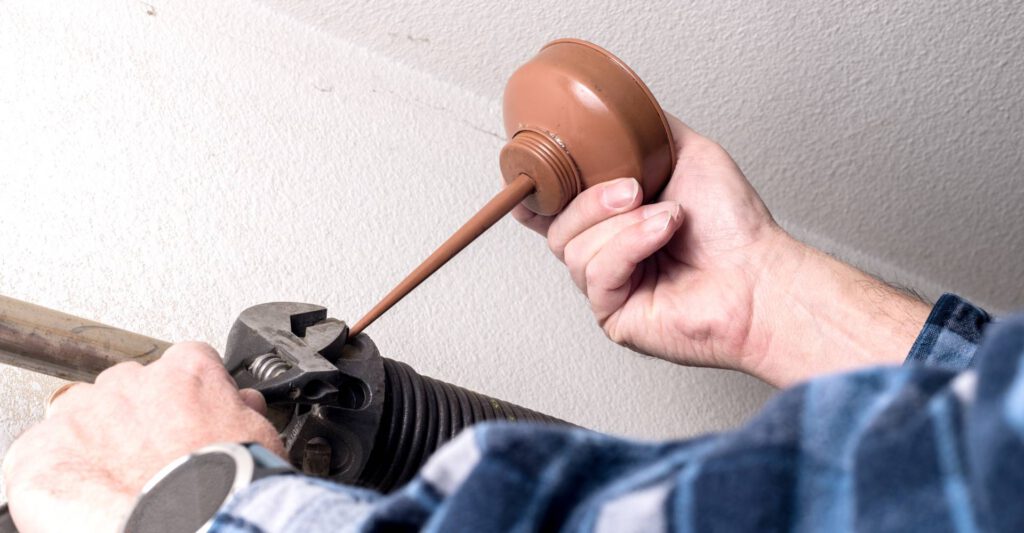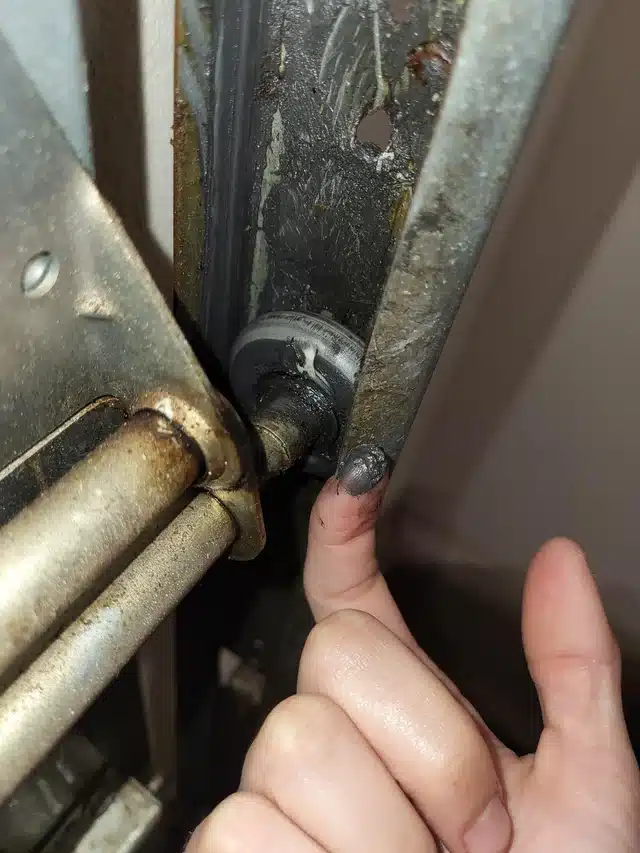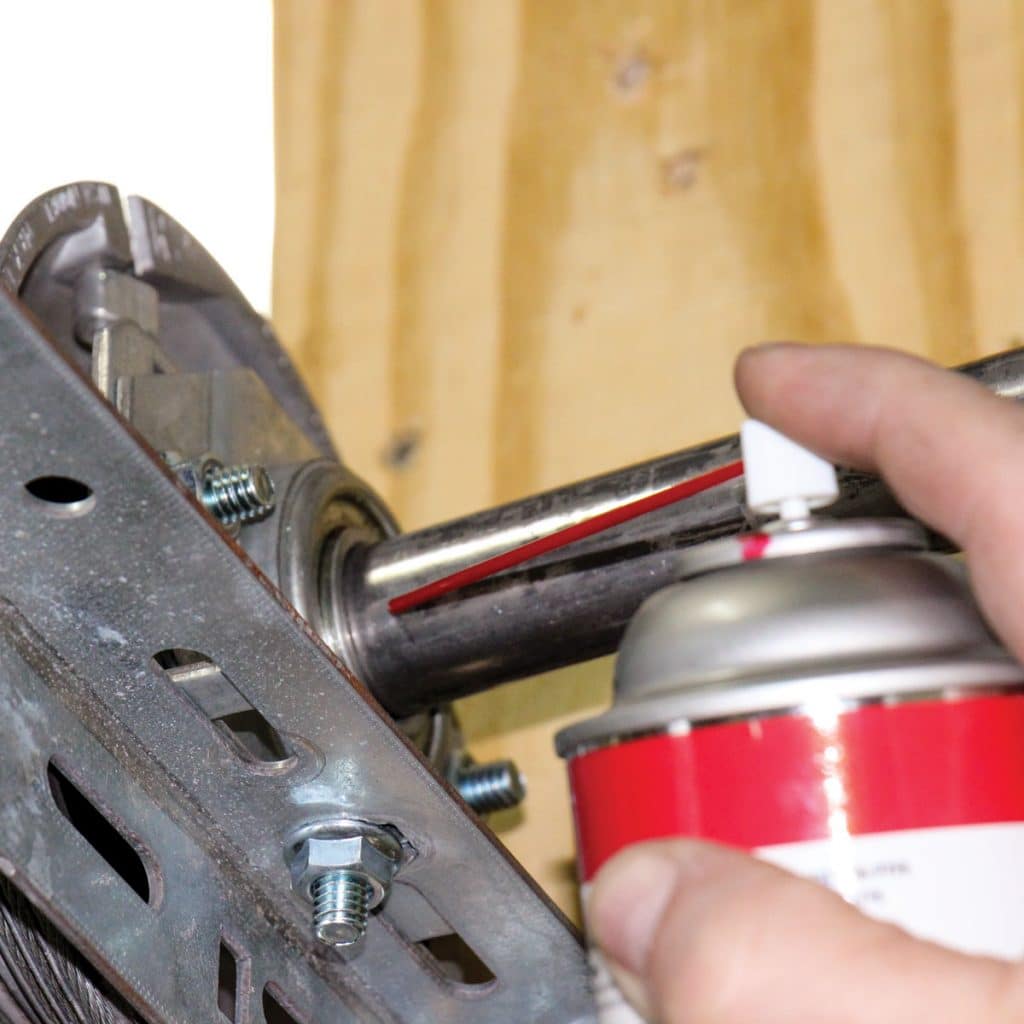A well-functioning garage door is essential for the smooth operation of your daily routine. Whether you use your garage for parking your car, as a storage space, or as an entry point to your home, a properly maintained garage door ensures convenience and security. Just like any other mechanical system, garage doors require regular maintenance to operate efficiently and last longer. Neglecting maintenance can lead to frustrating malfunctions and costly repairs down the line.
In this guide, we’ll delve into the crucial aspect of maintaining your garage door: greasing its mechanisms. Greasing your garage door is more than just a routine chore; it’s a proactive step towards preserving its functionality and extending its lifespan. By ensuring proper lubrication, you can prevent unnecessary wear and tear, reduce noise, and promote smoother operation.
So, if you’re ready to learn how to grease your garage door effectively and keep it running smoothly for years to come, let’s dive in!

Understanding the Need for Greasing
The Role of Lubrication: Preventing Friction and Wear
When it comes to your garage door, proper lubrication plays a crucial role in preventing friction and wear. Picture this: your garage door operates through a complex system of moving parts, including rollers, hinges, tracks, and springs. Over time, these components can accumulate dirt, dust, and debris, leading to increased friction and resistance when the door opens and closes. Without adequate lubrication, this friction can cause premature wear and tear, resulting in costly repairs or even complete system failure.
By applying grease to these moving parts, you create a protective barrier that reduces friction and minimizes the chances of damage. The lubricant acts as a buffer, allowing the various components to glide smoothly against each other, ensuring seamless operation. Additionally, grease helps to repel moisture and prevent rust, further safeguarding the integrity of your garage door mechanism.
Benefits of a Well-Greased Garage Door: Reduced Noise and Increased Lifespan
Now, let’s talk about the benefits of keeping your garage door well-greased. Firstly, a properly lubricated garage door operates more quietly than one that is neglected. If you’ve ever been jolted awake by the loud screeching of a garage door in the early hours of the morning, you’ll understand the importance of minimizing noise. By greasing the moving parts, you can significantly reduce the amount of noise produced during operation, creating a more peaceful environment for you and your neighbors.
Moreover, greasing your garage door can significantly extend its lifespan. Think of it as giving your car a regular oil change to keep the engine running smoothly. By providing the necessary lubrication, you help to maintain the integrity of the various components, preventing premature wear and ensuring long-term durability. In other words, a little grease now can save you from costly repairs or replacements down the line.
In summary, greasing your garage door is not just a maintenance task; it’s an investment in the longevity and efficiency of your door. By understanding the role of lubrication and the benefits it provides, you can ensure that your garage door continues to operate smoothly for years to come. So, let’s roll up our sleeves and get ready to grease those mechanisms!
Preparing for Greasing
Tools and Materials You’ll Need:
- High-quality grease: Choose a lubricant specifically designed for garage door mechanisms. Look for a lithium-based grease, as it provides excellent lubrication and is resistant to water and extreme temperatures.
- Cleaning solution: Before applying grease, it’s essential to clean the components thoroughly to remove any dirt, grime, or old grease buildup. You can use a mild detergent or specialized garage door cleaner for this purpose.
- Clean cloth or rag: You’ll need a cloth to wipe down the surfaces and remove excess grease.
- Lubrication applicator: Depending on the type of grease you’re using and the specific components you’re lubricating, you may need a brush, spray nozzle, or grease gun for precise application.
- Step ladder or stool: In some cases, you may need to access hard-to-reach areas of your garage door mechanism, so having a step ladder or stool on hand can be helpful.
- Safety gloves and goggles: Greasing your garage door involves working with potentially messy substances, so it’s essential to protect your hands and eyes from contact with grease or cleaning solutions.
Safety Precautions to Follow:
- Disconnect the power: Before you begin greasing your garage door, make sure to disconnect the power source to prevent any accidental activation of the door. This step is crucial for your safety, as it eliminates the risk of the door closing unexpectedly while you’re working on it.
- Secure the door: If possible, lock the garage door in the open position using the manual release mechanism or prop it open with a sturdy object. This prevents the door from accidentally closing while you’re working on it and ensures your safety.
- Wear protective gear: As mentioned earlier, wearing safety gloves and goggles is essential to protect your hands and eyes from exposure to grease and cleaning solutions. Additionally, consider wearing old clothes that you don’t mind getting dirty, as greasing can be a messy process.
- Work in a well-ventilated area: Grease and cleaning solutions can emit fumes that may be harmful if inhaled in large quantities. Therefore, it’s essential to work in a well-ventilated area, such as an open garage or outdoor space, to minimize exposure to fumes.
- Take your time: Greasing your garage door is not a task to rush through. Take your time to ensure thorough cleaning and lubrication of all components, and don’t hesitate to seek assistance if needed.
By following these preparatory steps and safety precautions, you’ll be well-equipped to begin the greasing process and maintain your garage door effectively.
Step-by-Step Greasing Process
Greasing Guidelines
- Inspect the Components: Before applying grease, visually inspect all moving parts of your garage door mechanism, including rollers, hinges, tracks, and springs. Look for signs of wear, damage, or excessive dirt buildup that may need attention.
- Clean the Components: Using a mild detergent or specialized garage door cleaner, thoroughly clean the surfaces of the components to remove any dirt, grime, or old grease. Use a clean cloth or rag to wipe down the surfaces and ensure they are free from debris.
- Apply Grease to Rollers and Hinges: Start by applying grease to the rollers and hinges of your garage door. Use a lubrication applicator, such as a brush or spray nozzle, to apply a thin, even layer of grease to each roller and hinge. Be sure to cover both the top and bottom of each roller and hinge for thorough lubrication.
- Lubricate the Tracks: Next, apply grease to the tracks along which the rollers move. Use a grease gun or similar applicator to apply a small amount of grease to the inside of each track, focusing on areas where friction is most likely to occur. Avoid applying too much grease, as this can attract dirt and debris and cause the rollers to become stuck.
- Grease the Springs and Bearing Plates: Finally, apply grease to the springs and bearing plates of your garage door mechanism. Use caution when working with the springs, as they are under tension and can be dangerous if mishandled. Apply a small amount of grease to the coils of each spring and to the bearing plates at either end of the spring assembly.
Tips for Thorough and Even Application:
- Use the right type of grease: Choose a high-quality lithium-based grease that is specifically formulated for garage door mechanisms. Avoid using general-purpose greases or lubricants, as they may not provide adequate protection against wear and tear.
- Don’t over-grease: Applying too much grease can be just as harmful as not applying enough. Aim for a thin, even layer of grease on each component to prevent excess buildup and avoid attracting dirt and debris.
- Wipe off excess grease: After applying grease to each component, use a clean cloth or rag to wipe off any excess grease. This helps to prevent drips and spills, as well as ensure that the grease is evenly distributed across the surfaces of the components.
- Test the door: Once you’ve finished greasing the garage door mechanism, test the door to ensure that it operates smoothly and quietly. If you notice any areas of resistance or unusual noise, double-check the components for proper lubrication and adjust as needed.
By following these step-by-step instructions and tips for thorough and even application, you can ensure that your garage door mechanism receives the proper lubrication it needs to operate smoothly and efficiently.

Common Mistakes to Avoid
Avoiding Greasing Errors for Garage Door Longevity: Common Pitfalls
Using the Wrong Type of Grease: One of the most common mistakes is using the wrong type of grease for your garage door mechanism. Using a general-purpose grease or lubricant may not provide adequate protection against wear and tear, leading to premature failure of the components.
- Over-Greasing: Applying too much grease can be just as harmful as not applying enough. Excess grease can attract dirt and debris, causing buildup that can interfere with the smooth operation of the door. It can also lead to messy drips and spills that are difficult to clean up.
- Neglecting Cleaning: Failing to clean the components before greasing them is another common mistake. Dirt, grime, and old grease buildup can prevent the new grease from adhering properly to the surfaces, reducing its effectiveness and causing premature wear.
- Ignoring Safety Precautions: Greasing your garage door involves working with potentially hazardous substances and machinery. Ignoring safety precautions, such as disconnecting the power and wearing protective gear, can lead to accidents or injuries.
How to ensure effective greasing: Try these solutions
- Choose the Right Grease: Select a high-quality lithium-based grease that is specifically formulated for garage door mechanisms. This type of grease provides excellent lubrication and is resistant to water and extreme temperatures, ensuring optimal performance and durability.
- Apply Grease Sparingly: Rather than slathering on thick layers of grease, apply it sparingly to each component. Aim for a thin, even layer that provides adequate lubrication without excess buildup. Use a lubrication applicator, such as a brush or spray nozzle, to achieve precise application.
- Thoroughly Clean Components: Before greasing, thoroughly clean the components to remove any dirt, grime, or old grease buildup. Use a mild detergent or specialized garage door cleaner and a clean cloth or rag to wipe down the surfaces. This will ensure that the new grease adheres properly and provides maximum protection.
- Prioritize Safety: Always prioritize safety when greasing your garage door mechanism. Disconnect the power to prevent accidental activation of the door, secure the door in the open position, and wear protective gear such as safety gloves and goggles. Take your time and follow all safety precautions to avoid accidents or injuries.
By avoiding these common mistakes and following the recommended solutions and alternative approaches, you can ensure effective greasing of your garage door mechanism and maintain its optimal performance and longevity for years to come.
Maintenance Schedule
Optimal Maintenance Intervals
Greasing Frequency: Ideally, you should grease your garage door mechanisms at least once every six months. However, if you live in a particularly harsh climate with extreme temperatures or high humidity, you may need to grease the door more frequently, such as every three to four months. Regular greasing helps to prevent friction and wear, ensuring smooth operation and prolonging the lifespan of your garage door.
- Other Maintenance Tasks: In addition to greasing, there are other maintenance tasks that you should perform regularly to keep your garage door in optimal condition. These include:
- Visual Inspections: Visually inspect the parts of your garage door at least once a month. Look for signs of wear, damage, or misalignment, such as frayed cables, bent tracks, or loose hardware. Deal with any problems as soon as possible to avoid more harm or safety risks.
- Lubrication of Moving Parts: In addition to greasing the main mechanisms, lubricate any other moving parts of your garage door, such as the lock mechanism and hinges, as needed. Use a silicone-based lubricant for these components to ensure smooth operation and prevent rust and corrosion.
- Tightening Hardware: Periodically check and tighten all nuts, bolts, and screws on your garage door and track system. Over time, these components can become loose due to vibration or normal wear and tear, so it’s important to keep them securely fastened to maintain structural integrity.
- Checking Weather Stripping: Inspect the weather stripping around your garage door regularly to ensure it’s intact and properly sealed. Replace any worn or damaged weather stripping to prevent drafts, water leaks, and energy loss.
- Visual Inspections: Visually inspect the parts of your garage door at least once a month. Look for signs of wear, damage, or misalignment, such as frayed cables, bent tracks, or loose hardware. Deal with any problems as soon as possible to avoid more harm or safety risks.
Inspections: Key to Door Longevity
- Safety Considerations: Regular inspections are not just about ensuring the smooth operation of your garage door; they’re also about safety. Serious threats to you, your family, and your property can arise from a broken garage door. By conducting regular inspections and addressing any issues promptly, you can minimize the risk of accidents and injuries.
- Prolonging Lifespan: Additionally, regular upkeep can significantly prolong the lifespan of your garage door and its components. By addressing minor issues early on, you can prevent them from causing more extensive damage that may require costly repairs or replacements down the line. Ultimately, investing time and effort in regular maintenance can save you money and hassle in the long run.
In conclusion, maintaining a consistent maintenance schedule, including regular greasing, inspections, and upkeep, is key to keeping your garage door in top condition. By staying proactive and addressing issues promptly, you can ensure the smooth operation, safety, and longevity of your garage door for years to come.

Frequently Asked Questions on How to Grease Garage Door
How often should I grease my garage door?
It’s generally recommended to grease your garage door mechanisms at least every six months. However, if you live in an area with harsh weather conditions or if your garage door sees heavy use, you may need to grease it more frequently, perhaps every three to four months. Regular greasing helps to prevent friction and wear, ensuring smooth operation and prolonging the lifespan of your garage door.
Can I use any type of grease for my garage door?
No, it’s essential to use the right type of grease for your garage door mechanism. Opt for a high-quality lithium-based grease that is specifically formulated for garage door applications. This type of grease provides excellent lubrication and is resistant to water and extreme temperatures, ensuring optimal performance and durability.
What parts of the garage door mechanism should I grease?
The main components of your garage door mechanism that require greasing include rollers, hinges, tracks, springs, and bearing plates. These are the moving parts that experience friction during the opening and closing of the door. Apply grease to these components to ensure smooth operation and prevent premature wear and tear.
Is it necessary to clean the parts before greasing them?
Yes, it’s crucial to clean the components thoroughly before applying grease. Dirt, grime, and old grease buildup can prevent the new grease from adhering properly to the surfaces, reducing its effectiveness and causing premature wear. Use a mild detergent or specialized garage door cleaner and a clean cloth or rag to wipe down the surfaces before greasing.
How can I tell if my garage door needs greasing or other maintenance?
Several signs indicate your garage door may need greasing or other maintenance. These include:
- Increased noise during operation, such as grinding, squeaking, or scraping sounds.
- Difficulty opening or closing the door, including sticking, jerking, or uneven movement.
- Visible signs of wear or damage on the components, such as rust, corrosion, or frayed cables.
- Irregular movement, such as the door moving too quickly or too slowly.
- If you notice any of these signs, it’s essential to inspect your garage door mechanism and address any issues promptly to prevent further damage and ensure continued functionality. Regular maintenance and greasing can help prevent these issues from occurring in the first place.
Conclusion
Throughout this guide, we’ve covered essential aspects of maintaining your garage door through effective greasing and regular maintenance. We discussed the importance of lubrication in preventing friction and wear, highlighted the benefits of a well-greased garage door, provided step-by-step instructions for greasing, identified common mistakes to avoid, and emphasized the significance of a maintenance schedule and regular inspections.
It’s crucial to implement the greasing process and adhere to a maintenance schedule to ensure the functionality and longevity of your garage door. By taking proactive steps to grease the mechanisms and perform regular inspections, you can prevent costly garage door repairs, reduce noise, and extend the lifespan of your garage door.
Ready to give your garage door the care it deserves? Keep reading for detailed instructions and expert tips on how to maintain your garage door’s optimal performance and ensure its longevity. With the right knowledge and proactive approach, you can keep your garage door running smoothly for years to come, providing convenience, security, and peace of mind for you and your family



